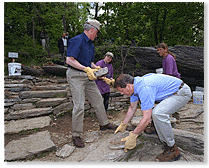 |
||

|
Today, on our nations 28th Earth Day, we have come to the
Appalachian
Trail and to this gorgeous confluence of rivers to celebrate the
foresight of early conservationists... We have come here to dedicate
ourselves to carrying forth their abiding sense of stewardship into
the new millennium. We have come here to promise that our children
will inherit an America whose natural bounty is even greater than it is
today.
President Bill Clinton |
|
|
Protecting the Environment: A Record of Accomplishment President Clinton Celebrates Earth Day at Harper's Ferry Protecting Our National Treasures: A Report to the President and Vice President Today, President Clinton and Vice President Gore commemorate Earth Day by traveling to Harper's Ferry, W. Va., to help volunteers maintain America's longest footpath, the Appalachian Trail. Their efforts, and those of countless others today across the country, reflect America's deep commitment to saving and restoring our natural treasures. In five years, the Clinton Administration has protected or enhanced nearly 150 million acres of public and private lands, from from world-famous parks to hidden backyard wonders. The President and Vice President are fighting to save and restore more of America's natural treasures, and today called on Congress to support -- not thwart -- these efforts. The Land that Binds Us. The Appalachian Trail, running 2,157 miles through 14 states, symbolizes the bonds between our people and our land. Trekking from mountain to valley to city and town, we are inspired by nature's wonders and discover traces of our past. Generations of volunteers have built and maintained the trail. President Clinton is working to acquire the last remaining stretches so the entire path, from Georgia to Maine, is protected. A Conservation Legacy. At the dawn of the 20th century, Theodore Roosevelt committed America to the conservation of our land and resources. As we near a new century -- and a new millennium -- President Clinton is fulfilling that legacy. He has preserved California's desert and the red rock canyons of Utah, and is working to restore the Florida Everglades, protect Yellowstone from mining, and save the ancient redwoods of Headwaters Forest. New Partnerships for Land Stewardship. President Clinton is forging a new conservation vision for a new era, building partnerships so that all Americans can help nurture our lands. Conservation is no longer just creating parks and refuges. Most of our land is in private hands. So we are lending families and farmers the tools to better tend their lands. Innovative collaborations are providing habitat for fish and wildlife, cleaning our water, and protecting our soil -- while ensuring that people can continue to make a living off their land.
|
||
To comment on this service,
send feedback to the Web Development Team.
![[White House icon]](/New/images/home_pin.gif)
![[Help Desk icon]](/New/images/help_pin.gif)